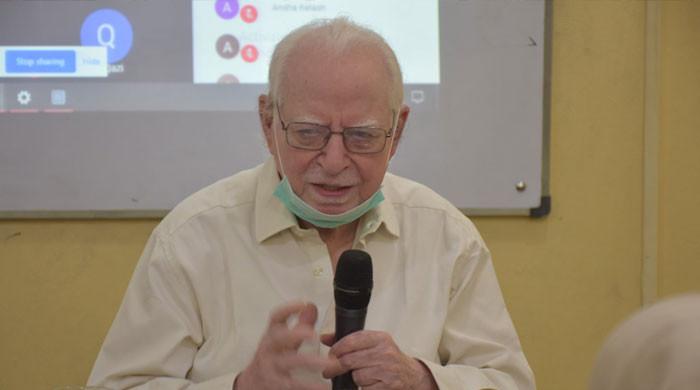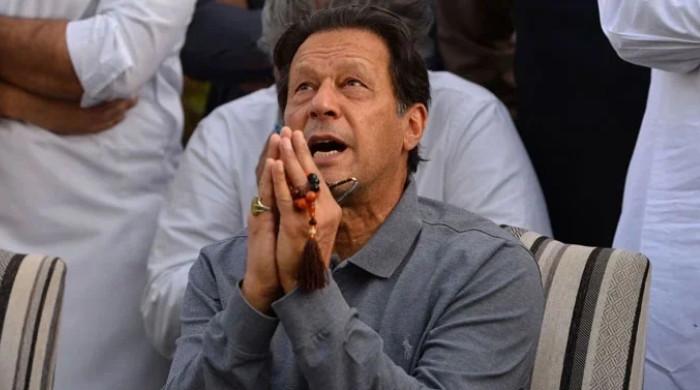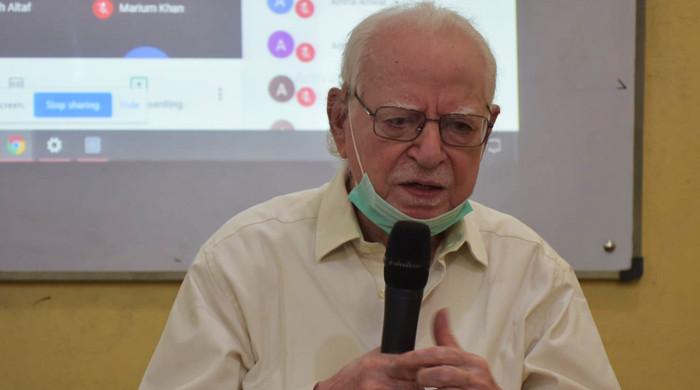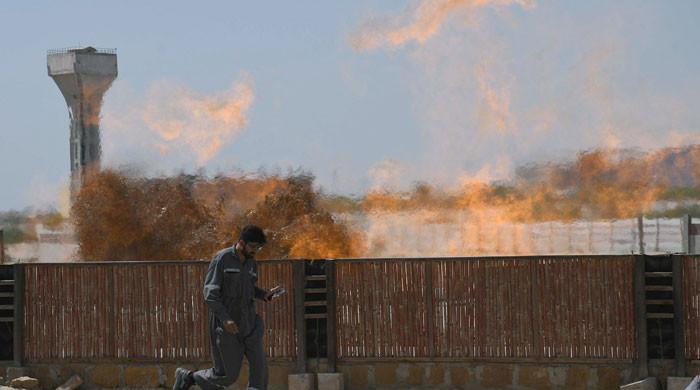Senate body approves 'contentious' Peca bill amid JUI-F, journalists' opposition
"How can this bill be approved so quickly? There wasn’t enough time to read, let alone consult on it," says senator
January 27, 2025
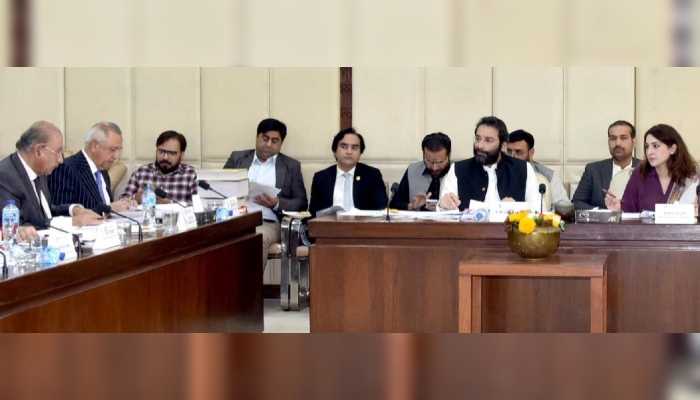
- JUI-F opposes the bill for being rushed.
- No clear definition of "fake news" in bill.
- Approved earlier by NA on January 23.
ISLAMABAD: The Senate Standing Committee on Interior has approved the Prevention of Electronic Crimes Act (Peca) amendment bill despite opposition from Jamiat Ulema-e-Islam-Fazl (JUI-F) and journalist organisations.
According to Geo News, during discussions on the bill, JUI-F Senator Kamran Murtaza expressed concern over the hasty approval process. "How can this bill be approved so quickly? There wasn’t enough time to read, let alone consult on it," he remarked.
He criticised the bill for its lack of clarity, saying that the term "fake news" is undefined, raising questions on how it would be determined.
PML-N Senator Irfan Siddiqui acknowledged the concerns of journalists, saying: “It would have been better to consult journalists beforehand. However, we agree with the essence of the bill, as addressing the issue of fake news, particularly on social media, is crucial."
The interior ministry's secretary requested the committee to approve the bill in its current form, as passed by the National Assembly, noting that the government has introduced amendments to improve its implementation.
Meanwhile, the PFUJ has announced to stage nationwide protest on Tuesday (tomorrow) against the Peca law, saying the Senate had passed a draconian law.
“This law puts restrictions on media, social media and freedom of expression. An appeal was made to the government demanding consultation of all the stakeholders on the law, but the government turned a deaf ear towards it," the journalist union stated, rejecting the law “in violation of the constitution”.
On the other hand, Pakistan Tehreek-e-Insaf (PTI) Chairman Barrister Gohar Khan said a delegation of news anchors had met him and expressed concern over the Peca law.
Gohar said a bill had been passed within minutes by the assembly, calling it an attempt to arrest people on pretext of fake news.
“The government is enacting laws in haste. You are putting people in new trouble [through it],” he said.
The National Assembly on January 23 approved the Peca (Amendment), 2025, making changes to the existing controversial law, drawing severe criticism from journalist bodies as well as the opposition.
Pakistan Federal Union of Journalists (PFUJ) Secretary General Arshad Ansari told Geo News that journalists would challenge the tweaks in the court and announced boycotting assembly sessions.
The bill was approved within minutes after Federal Minister for Industries and Production Rana Tanveer Hussain presented it as the opposition parties had already staged a walkout.
This includes new definitions, the establishment of regulatory and investigative bodies, and stricter penalties for disseminating "false" information.
The government aims to lower the punishment for spreading “fake information” online to three years, according to a draft of the document, while they may also face a fine of up to Rs2 million.
"Whoever intentionally disseminates, publicly exhibits or transmits any information through any information system, that he knows or has reason to believe or has reason to believe to be false or fake and likely to cause or create a sense of fear, panic or disorder or unrest in general public or society shall be punished with imprisonment which may extend up to three years or with fine which may extend to two million rupees or with both,” Section 26A of the bill said.
The parliament's lower house greenlighted the bill hours after journalist bodies — including the PFUJ, Association of Electronic Media Editors and News Directors, All Pakistan Newspapers Society, Council of Pakistan Newspaper Editors, and Pakistan Broadcasters Association — had rejected the proposed amendments.
Meanwhile, the newly amended bill also proposes establishment of the Social Media Protection and Regulatory Authority (SMPRA), the National Cyber Crime Investigation Agency (NCCIA) and the Social Media Protection Tribunal.
The statement of objects and reasons said that the Prevention of Electronic Crimes (Amendment) Bill 2025 aims to modernise and enhance the legislative framework for combating cybercrime in Pakistan, ensuring alignment with present-day requirements and addressing the growing complexities of cyber threats.
Furthermore, it stated, any person "aggrieved by fake and false information" can approach the authority for removal or blocking access to such information and the authority would issue orders no later than 24 hours on the request.
According to the bill, the authority should consist of a chairperson and eight other members out of which the secretary Ministry of Interior, the Pemra chairman and Pakistan Telecommunication Authority (PTA) chairman or any member of PTA. "The Chairperson and five members, other than ex-officio members, shall be appointed by the federal government for a non-extendable period of live years," it added.
The proposed changes also stated that the authority might require any social media platform to enlist with it any manner, form and on payment of such fee as may be prescribed.
It added that apart from the requirements of the act, additional conditions or requisites as deemed appropriate might also be stipulated while enlisting a social media platform.
The bill stated that the authority would have the power to issue directions to a social media platform for removal or blocking of online content if it was against the ideology of Pakistan;
- incites the public to violate the law, take the law into own hands, to coerce, intimidate or terrorise public, individuals, groups, communities, government officials and institutions
- incites the public or section of the public to cause damage to governmental or private property
- coerce or intimidate the public or section of the public and thereby prevent them from carrying on their lawful trade and disrupting civic life
- incite hatred and contempt on religious, sectarian or ethnic basis to stir up violence or cause internal disturbance
- contains anything obscene or pornographic in contravention of any applicable law
- is known to be fake or false or there existed sufficient reasons to believe that the same may be fake or false beyond a reasonable doubt
- contains aspersions against any person, including members of judiciary, armed forces, parliament or a provincial assembly
- or promoted and encouraged terrorism and other forms of violence against the state or its institutions.
Additionally, the newly amendments also proposed the constitution of a Social Media Complaint Council to receive and process complaints made by aggrieved parties against violation of any provision of the cybercrime law.
The bill also proposed the establishment of Social Media Protection Tribunals. Each tribunal will be consisted of a chairperson qualified to be a high court judge, a journalist registered with a press club, and a software engineer.
Tribunals must resolve cases within 90 days, with appeals allowed to the Supreme Court within 60 days.
Meanwhile, it also proposed the establishment of an investigation agency to be called the National Cyber Crime Investigation Agency (NCCIA) for inquiry into, investigation and prosecution of the offences specified under this Act.




